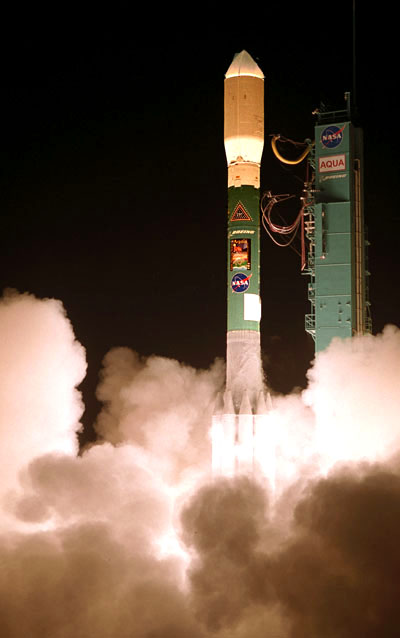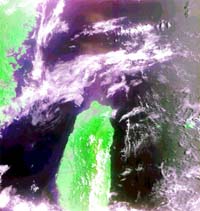IOCCG-sponsored
training courses
Course on Primary Production at University of Concepción
 IOCCG will be sponsoring a graduate course on 'Primary production: Theory, modelling and estimation by remote sensing' at the University of Concepción, Chile from October 21 to November 1, 2002. This course will be a part of an International eight-course series organised by the University of Concepción, Chile. The series is targeted at graduate and senior undergraduate students from Latin America and runs from September 2, 2002 to January 2003. For further details on the primary production course visit the IOCCG Training & Education page.
IOCCG will be sponsoring a graduate course on 'Primary production: Theory, modelling and estimation by remote sensing' at the University of Concepción, Chile from October 21 to November 1, 2002. This course will be a part of an International eight-course series organised by the University of Concepción, Chile. The series is targeted at graduate and senior undergraduate students from Latin America and runs from September 2, 2002 to January 2003. For further details on the primary production course visit the IOCCG Training & Education page.
Remote Sensing Applications Workshop
 The IOCCG will be co-sponsoring another ocean-colour workshop in the Pacific entitled, The 2nd Remote Sensing Applications Workshop. It will take place in Nadi, Fiji from 8-10 October, 2002. This workshop is a follow on from the workshop on Remote Sensing Resources for Marine Management, which was held in Noumea, New Caledonia last September, and is designed to develop strategies considered appropriate for regional implementation. The workshop is open to invited delegates from Pacific Island nations who have both the interest and authority to propose and implement plans for regional management of marine resources. For further details about the workshop, visit the IOCCG Training & Education page.
An update on the workshop regarding prospective candidates will be issued shortly.
The IOCCG will be co-sponsoring another ocean-colour workshop in the Pacific entitled, The 2nd Remote Sensing Applications Workshop. It will take place in Nadi, Fiji from 8-10 October, 2002. This workshop is a follow on from the workshop on Remote Sensing Resources for Marine Management, which was held in Noumea, New Caledonia last September, and is designed to develop strategies considered appropriate for regional implementation. The workshop is open to invited delegates from Pacific Island nations who have both the interest and authority to propose and implement plans for regional management of marine resources. For further details about the workshop, visit the IOCCG Training & Education page.
An update on the workshop regarding prospective candidates will be issued shortly.
IOCCG Fellowships
The application submission deadline for the IOCCG Fellowship Programme has been extended to June 30, 2002. This programme offers the opportunity for young scientists from developing countries to receive hands-on training at a foreign institute.
Please see the Training & Education page for further details.
News from SeaWiFS
Reprocessing Update
The SeaWiFS project office has requested feedback from the ocean colour community on the results of the extensive analyses carried out in preparation for the planned fourth reprocessing of the SeaWiFS data set. These results have been posted on a special web page dedicated to the reprocessing.
There are nine major enhancements and each change is fully described. In addition to the incremental changes, there are also analyses of the overall changes in SeaWiFS data products resulting from the specific changes.
Ocean Color Panorama
NASA has created a new website dedicated to ocean colour data and observations called the Ocean Color Panorama. By mid-June, the link "Ocean Color" on the GES DAAC home page will be connected to this page. Additional content is expected to be added to this website in a few months.
Data Transfer
In order to improve data transfer rate, the ocean colour data support team (OCDST) in collaboration with the SeaWiFS project office has created a modified procedure for data ingest. This will enable the OCDST to transfer the entire volume of reprocessed data in less than a month. However, this modification also means that the subscribers will now have to use the SeaWiFS Data External Browser or the www browser to order the reprocessed data files. They will not get the reprocessed data automatically.
SeaDAS 4.2 released
SeaDAS version 4.2 was released recently to enhance the operating system support and ability to run in 24-bit display mode on RedHat Linux 7.0, 7.1 and 7.2 platforms. The new version also allows the user to run the program under bash shell environment, which is the default shell environment on most new Linux installations. However, the SeaWiFS processing programs included in this version are identical to those in the earlier SeaDAS 4.1 release. Another release, SeaDAS 4.3, is expected sometime within the next couple of months, and will include the changes to the processing programs for the fourth reprocessing.
For downloading and installation details, visit the SeaDAS website.
|
|
Two new ocean-colour satellites launched
Last month saw the launch of a further two new satellites carrying ocean-colour sensors: NASA's Aqua satellite carrying the MODIS sensor and the Chinese HY-1 satellite carrying the COCTS sensor. This brings the total number of ocean-colour sensors in orbit to ten! This suite of sensors will help to ensure continuity of a long-term, uninterrupted ocean-colour data stream.
MODIS-Aqua Launched
 NASA's Earth-observing Aqua satellite was launched on May 4, 2002, from Vandenburg Air Force Base aboard a Delta II rocket. Aqua will help scientists understand the Earth's water cycle and environment, using six different remote-sensing instruments. It also carries the second Moderate Resolution Imaging Spectroradiometer (MODIS) instrument.
NASA's Earth-observing Aqua satellite was launched on May 4, 2002, from Vandenburg Air Force Base aboard a Delta II rocket. Aqua will help scientists understand the Earth's water cycle and environment, using six different remote-sensing instruments. It also carries the second Moderate Resolution Imaging Spectroradiometer (MODIS) instrument.
Scientific data from this instrument is expected by end of June. The combination of MODIS data from Terra and Aqua will be used to study changes in the ocean over the course of a day (Terra collects data locally in the morning, whereas Aqua collects data locally in the early afternoon).
In addition, merged products from Terra and Aqua will improve the daily global coverage of MODIS ocean data.
HY-1 Launched
 One of the first images sent by HY-1
One of the first images sent by HY-1
The Chinese HY-1 satellite carrying the Chinese Ocean Colour and Temperature Scanner (COCTS) was successfully launched by a CZ-4B rocket at the Taiyun Satellite Launching Center in north China's Shanxi Province, on 15 May, 2002. The satellite was placed in a near sun-synchronous polar orbit at an altitude of 798 km.
The main sensors include the 10-band COCTS as well as a 4-band charge-coupled device (CCD). The first orbit images were received by ground stations in Beijing and Sanya, on 29 May, 2002 and both instruments appear to be working well.
HY-1 is now undergoing in-orbit testing, after which it will be fully functional. COCTS will obtain ocean-colour data for primary production, coastal zone changes and environmental monitoring of the China Seas. Also on board the CZ-4B rocket was the Fengyun-1D (FY-1D), a first generation meteorological satellite developed by China, which will lead the way to comprehensive weather services and monitoring the global environment.
ACRIST course on general-purpose IDL tools
 A three-day training course, on general-purpose IDL tools to analyse and visualise MERIS data will be conducted by ACRIST at Sophia-Antipolis, France from July 22-24, 2002. Dr. Marcel Babin, from the Observatoire Océanologique de Villefranche-sur-Mer will also be giving a presentation on MERIS ocean processing. The course organisers are willing to conduct additional courses elsewhere upon request.
For details, visit the Training & Education page.
A three-day training course, on general-purpose IDL tools to analyse and visualise MERIS data will be conducted by ACRIST at Sophia-Antipolis, France from July 22-24, 2002. Dr. Marcel Babin, from the Observatoire Océanologique de Villefranche-sur-Mer will also be giving a presentation on MERIS ocean processing. The course organisers are willing to conduct additional courses elsewhere upon request.
For details, visit the Training & Education page.
New references and vacancies
Several new references, and three new employment opportunities, have been added to the website.
|


 A three-day training course, on general-purpose IDL tools to analyse and visualise MERIS data will be conducted by ACRIST at Sophia-Antipolis, France from July 22-24, 2002. Dr. Marcel Babin, from the Observatoire Océanologique de Villefranche-sur-Mer will also be giving a presentation on MERIS ocean processing. The course organisers are willing to conduct additional courses elsewhere upon request.
For details, visit the Training & Education page.
A three-day training course, on general-purpose IDL tools to analyse and visualise MERIS data will be conducted by ACRIST at Sophia-Antipolis, France from July 22-24, 2002. Dr. Marcel Babin, from the Observatoire Océanologique de Villefranche-sur-Mer will also be giving a presentation on MERIS ocean processing. The course organisers are willing to conduct additional courses elsewhere upon request.
For details, visit the Training & Education page.